Rusty Barnes's Blog: Fried Chicken and Coffee, page 11
April 18, 2016
Apollo 11, poem by Ron Cooper
Dishes washed and dried,
Kitchen floor swept three times,
Countertops polished five,
Mother rearranges silverware, dusts cabinets.
Father gets another cup of coffee.
“Go on to bed, Martha. If Gabriel toots, it’ll wake you.”
But she refolds the dishrag,
Looks out the window, up.
A phone call this late usually relays death,
But this night we know it’s another
Rapture watcher offering and seeking comfort.
“Them pew-jumpers are all shook up,” Father says
To me, nine years old, allowed to stay up late this long night.
I hear her flipping pages,
Reading into the phone from Ezekiel, Revelation, Psalms.
Neil Armstrong steps, leaps giantly.
Father announces, “We’re still here, Martha.
No Jesus, no Devil.
Call the preacher and tell him his job’s safe.”
She goes out to sit on the steps.
Later, as a chuck will’s widow wails,
And log trucks rumble on the dark highway
Like any other night,
I look from my bedroom window to the porch
Where lightning bugs flash
And she sits, waits,
Stares at the sky,
At its awful sameness.
 Ron Cooper grew up in the South Carolina swamps and has lived in Florida for the past twenty-eight years. His poems, stories, and essays have appeared in publications such as The Chattahoochee Review, Yalobusha Review, and Deep South Magazine. He is the author of the novels Purple Jesus (which the Washington Post called “a literary event of the first magnitude”), Hume’s Fork, and, most recently, The Gospel of the Twin (which Fred Chappell called “an enthralling story!”). Cooper teaches at the College of Central Florida. His website is www.roncooper.org
Ron Cooper grew up in the South Carolina swamps and has lived in Florida for the past twenty-eight years. His poems, stories, and essays have appeared in publications such as The Chattahoochee Review, Yalobusha Review, and Deep South Magazine. He is the author of the novels Purple Jesus (which the Washington Post called “a literary event of the first magnitude”), Hume’s Fork, and, most recently, The Gospel of the Twin (which Fred Chappell called “an enthralling story!”). Cooper teaches at the College of Central Florida. His website is www.roncooper.org
April 15, 2016
Baloney, poem by Thomas Alan Holmes
Baloney
I.
Usually, when I commit to it,
I’ve bought pre-packaged, thick-sliced stuff
that has red plastic casing around the edge.
I lay some slices down and take a table knife
I can wash in the sink
and cut the stuff in half, then notch
another cut cross-wise in the middle.
My frying pan spitting hot, I pull
cold pink baloney from dangling casing strands,
drop slices flat into the pan,
and run the casing across my open mouth,
corner to corner, hooked in tongue curl,
savoring last clinging morsels.
Grease pops as I sear baloney edges,
notched to keep them flat
against sizzle nested
between seasoned meat and seasoned iron,
baloney caramel and scorch,
until I can’t wait any more,
sometimes not even long enough
to snug it into a biscuit
or a folded slice of near-burnt toast.
II.
Sitting in a two-door ’72 LTD Brougham
outside a county grocery
in August, windows down,
heat shimmer like blown puddles
on asphalt so hot I can smell it,
wet with sweat after driving
with one shoulder hitched just so,
letting wind blow into my left sleeve
to make my shirt ripple flaglike,
opening white butcher’s paper
of fresh-sliced baloney from a hefty chubb,
storebrand white bread and an RC,
three dollars and change in my pocket
and no worries about having enough
money to make it back home
once I find a rural route
busy enough to have a yellow stripe,
deliberately a little lost,
I am.
 Thomas Alan Holmes, a member of the East Tennessee State University English faculty, lives in Johnson City. Some of his work has appeared in Louisiana Literature, Valparaiso Poetry Review, Appalachian Heritage, The Connecticut Review, The Appalachian Journal, North American Review, Stoneboat, The Florida Review, Blue Mesa Review, Pine Mountain Sand & Gravel, Still: The Journal, and The Southern Poetry Anthology Volume VI: Tennessee, with poems forthcoming in Seminary Ridge Review and The World Is Charged: Poetic Engagements with Gerard Manley Hopkins (Clemson U P).
Thomas Alan Holmes, a member of the East Tennessee State University English faculty, lives in Johnson City. Some of his work has appeared in Louisiana Literature, Valparaiso Poetry Review, Appalachian Heritage, The Connecticut Review, The Appalachian Journal, North American Review, Stoneboat, The Florida Review, Blue Mesa Review, Pine Mountain Sand & Gravel, Still: The Journal, and The Southern Poetry Anthology Volume VI: Tennessee, with poems forthcoming in Seminary Ridge Review and The World Is Charged: Poetic Engagements with Gerard Manley Hopkins (Clemson U P).
April 12, 2016
What These Boots are Made For, fiction by Matt Prater
Ten years and more had passed, and Joy was now a Ms.
That part of it was not as hard as she’d been told; the good things in a bad man weren’t so much, she’d found, that the loss of them would dent more than a year in your life. What had been hard, though, was that still, when so much of her friends had moved or bought homes or had kids, had found a guy or girl to get hitched up with, had got knocked up or been to jail or fought in wars or won or lost at some great thing—or died—or had just found a job in Cave Spring or, hell, in Big Stone Gap, what had she done with her nose in books, eyes set on New York, life?
Taught at the same school she’d went to as a girl.
Drove the same car her Dad bought her in high school.
Broke up and moved on, but lost her best good dog.
And, yes, moved on and up from Ms. Joy to Ms. Wells when Rose Call died and no one else at the school asked for her job. Four years out of Tech, the one big win she’d had was a job she still might not have got had Coach Null’s wife, or the new flirt aide from the beach, had asked for it.
Kate had known—known all of it—when she and Joy were best friends and still in school. Had seen the whole damn thing. Kate had told her to leave and not look back. Kate had told her not to date Jeff, that he was a scrub. Kate, in fact, had said to go with her to the Air Force—or, if she was so bent on Tech, to join the Corps while she was there. There was cash in that, at the end; school all paid for, moved to a new town, skills for a job—and, yes, the risk—but Kate had said the risks of home were just as bad. More girls like them had died from pills than died in wars.
But now ten years had passed, and Joy was still here, still stalled, still what she was; while Kate had came back home with cash and scars and chest pins, with a way to walk in and know how to hold up her sharp dress blues. Had it all been smooth? Of course not. Joy’s friend had been there, in the worst place to be in a long dumb fight, and in the worst of all times to be there. Kate saw the Surge, and the Surge did not change things. Kate’s job had not been to fight, but at some few times she had to, and had done it well. She hauled a big gun then, and when she had to shot it with some skill.
All of these things, of course, weren’t things Kate or Joy would give much talk to. Joy, for her part, had made sure that when Kate came home she came home in her mind. Not that she could make it that way, but at least she tried. Kate, for Joy, was a girl to keep up and off the tramp of frat boys and frat men who saw her in boots and a bun, and for those things did not see her at all; or men who did not see her boots or sharp dress blues at all since she was just Kate—Kate the flirt or Kate the drunk or Kate Bob’s kid or just plain Kate that girl.
“You look so nice with your hair grown out,” Joy would tease her. “Grow it out, I want to braid it. Pweeze.”
“When I grow it out it just gets caught in stuff and gets pulled.”
“You don’t like it when I pull your hair?” Joy would wink at her.
“Girl, you’re a goob.”
These things, on top of all the rest, were why Chris had pissed Joy off so much when, when he saw them out, he just walked up and asked Kate to come talk to the kids on war, as if that was a thing you asked. Joy did not like it when guys talked to Kate re the war or the Air Force – not a one failed to ask some dumb thing on guns or trucks or what girls did or why or if they could. At least Chris was just the type who thought Kate’s butt looked good in blues…but still, just…ew.
And worse that it was Chris. Chris, the king of frat boys, had no years on Joy but had come from the next town up, and was a guy, and had played ball in school (and coached it now), so he was the one they’d picked to run the school. In fact, in the just two years he’d taught a real class, Chris had been the king of screens; and now he seemed to think all things could be solved with prep tests, screens, and drills. So Kate kept clear of him when she could help it; and on days she had to, showed just a bit of boob.
Chris was not just the kind of guy who thought tests told the truth, or who thought the sharp knot of his tie (or the cell phone clip on his belt) made him right, who thought he could count up all the kids just like ghosts on the head of a pin; but, on top of that, he was the kind of man who sat in rooms with an odd count of men and made votes—the kind of man who did not think the count of those men, nor the count of men, was odd. In short, Chris did what he liked and liked who let him do it. This year, Chris liked the war, or at least he liked the folks who fought it, and he thought it would a good thing for the kids if they liked them, too. What the school should do, he’d said, was to have a big Red White & Blue day for the troops! Bring them in, feed them cake, and have them tell the kids why it’s great to serve.
This had made Joy, back of Chris and Kate’s talk, a bit qualmed to start with. “I think this would be a great thought for the High School,” she said.
“I meant we should do it here.”
“Oh, I know, it’s just…”
“I mean if you don’t think you have time—” which was his way to call her slack.
“No, it’s not that. I just think we need to think how best to do it—” which was her way to call him an ass.
“What do you mean?”
“I just mean, how do we talk to eight year olds so they get War?”
“Well, we just tell them the truth.”
“And what if their folks don’t like that?”
“Eh, I don’t think they’ll mind. Who here won’t vote for Mitt?”
“Well…I know a few.”
“See? All the more why we’ve got to do this big!”
As Joy was want to say, it makes an ass of you and me. But still, as in all things, Chris got his way. And since Kate liked Chris for who knew why, Joy kept her mouth shut. And the day was big. They made a whole big brunch: red ham, white eggs, and blue fruit, with gold hash browns on the side. Then they all went to the gym and said the pledge and heard the high school choir sing “She’s a Grand Old Flag” and “This Land is Your Land” (sans the last verse or so). Then they heard the third grade champ read his state DAR third place work, “It Is Not Free To Be Free,” in which he wrote of his dad’s two tours and one Bronze Star. His dad was there, had his Star on, and cried. Some of the kids cried, too. Then there were more songs, and a short speech from Ms. Stone (who taught first grade, but used to be in the Air Force, too), and then they all went back to class.
It still turned out to the good though, all in all. Kate got to spend the whole day with Joy’s kids, and talked to them less on war and more on what girls could do, and how girls were just as good as boys (and she got one of the boys to face off with her in push ups in the gym, and beat him, which made him and all of the boys love her), and then when they got back to class, for the last hour of the day she said she’d take on all they could ask.
***
“What kind of shoes do you like best, high heels or boots?”
“I don’t wear boots, just pumps now. You know I’m old now, right?” she winked.
“You’re not old!” some of them yelled.
“Well, high heels hurt more than boots, but they look good. Does that help?”
***
“Ms. Kate, will you look at my boots?”
“Well, those sure are cute boots! Where’d you get them?”
“At the store.”
***
“Ms. Kate, what did you do when you got scared?”
“When we got scared we worked. We train a lot, so that when things get hard we just do what we know. We don’t say can’t.”
***
“Do meal packs taste good?”
“Ya’ll want to see one? We learned how to make them from the folks who flew in space,” she said, which was kind of true, as she pulled one (pork rib) out of her bag.
***
“Ms. Wells says that fights are bad? If that’s true, why did you do it?”
“When you fight for folks when they get hurt and need help, that’s a good thing. We helped a lot of kids, just like all of you, boys and girls whose schools had been closed down. We fixed their schools and got them food and books.”
***
“Did you get shot?”
“Nope,” she said. “But I did get to blow up a bridge, though. That was cool.”
“Un-uh!” some of the girls winked at her.
“Uh-huh!” she winked back.
***
“Um, I don’t think girls can blow things up,” John said.
“John…” Ms. Wells said.
“Hell yes we do!” Kim yelled back at him.
“Kim! We do not say that word in school,” Ms. Wells cut in.
“Well let’s play house, cause what he said was dumb.”
“Kim.”
“Dude, my bad,” John said.
“I’m not a dude.”
“I just meant girls help out in war; they don’t fight.”
“Yeah, right.”
“Well, Kim, John is right,” Kate said. “I was with the Corps, and we built things. My job was to tear down old sites so we could fix them up. So when I blew up things, it was with a charge, not a bomb. But, John, Kim’s right too. Girls do fight in war, and some get hurt.”
***
“Did girls die there?”
“Yes, they did.”
***
“We wish you worked here, Ms. Kate. We like you a lot!” two girls came up and told her and hugged her on the legs when she was off to leave at the end of the day.
“Aww, I like you all, too. I’ll be back,” she said, and held up the Scout sign. The girls gave Kate the Scout sign back.
Kate did need new work, in fact, now that she was home. That she had trained well in her field had not meant she had been hired well in her field when she came back. Girls blew up and built the world at war; at home, well, some folks still thought not so much.
“Will you come play with us? Do you have to go?” they said, and dragged her towards the field.
“Yes, I can stay and play with you.”
“Can we play, too?” a few of the boys ran up to ask.
Kate knew the hearts of boys at ten, who played games that starred guns, and who were turned by that play to men who fought and men who screwed down the world’s taut chains. When she was ten, Kate, too, was a mud faced girl and played with mud faced boys. Good boys who joined the Corps or Air Force; good boys who served; good boys who, some of them, had fought with her; and good boys who did not come home. How could she share with them the strange weight they took home, all of them, this thing which could least by said or known by those who loved them most? At times it seemed no one who did not know could help, and that no one who did know was less hurt or of more use.
And yet they span in loops, each of them their own moon, the lot of them a score of moons, lit by what words did not need to prove was the same fracked heart. In their light, which came from the light which gives all light to the world, the red leaves that fell that day, and the cold creek near them, where the stock trout gorged and slowed so as to keep with the year of the Lord, the fruit of the earth and the fall of that fruit (which makes up the year of the Lord), on a day which—save the day of fire which comes next time to clean up the world from the world—as all days the fruit will come and fall and come back in its turn for all time, a day with no need to be mourned or dried or stored or kept. Kate spun in heels and the oak leaves fell, while small girls and boys in rain boots laughed and spun, who did not need to know at all the things they knew how to cure.
“You could do that for a job, you know that right?” Joy said, that night, the two of them tucked in close.
“Phhht. No way. I’m not near as good with kids as you are.”
“Yeah, you are.”
“I just play with them. I don’t have to teach them.”
“Well, I still know they like you a lot more than they like me.”
“Oh, that’s not true. I’m just the new toy.”
“No, no. It’s more than that.”
“Dude, what’s up with you? You’re not a mope kind of girl.”
“Yeah, this time I think I am.”
“What’s up?”
“They can smell it on you, you know?”
“Smell what?”
“The stuck. They smell the stuck on you a whole mile off. They don’t know what it is, but they can smell it.”
“What do you mean, the stuck? Don’t whine. It’s not cute.”
“I’m…I…it’s just…I don’t know.”
“What? What? Girl, do you know what I would have done to have been stuck here with you?”
“I know.”
“No, you don’t know. You don’t know. So stop your whine.”
“Please, please don’t bite my head off. I just…I just thought I could talk to you.”
“Of course you can. But you know what I’ve got to say.”
“It ain’t so bad?”
“It ain’t so bad.”
“But Kate, I can’t change things. I do things, I try things, and things don’t change. The kids don’t change. Their folks don’t change. My house don’t change. It’s all the same and all the time and it. just. does. not. change.”
What Kate could try to say, but what she could not say – some of them did go to save the world; and some did go to kill folks they’d been told, that they had long been made to think, been shaped to think, were not real folk at all. But these ways were true, in truth, for so few of them in their clean dress greens and boots. Kate had not gone to fight; she went to work. She had not gone to go out and see the world and the strange lands in it. She went to get the ghosts of coal and cow out of her life. There was cash and a house on the base, and the cash and the house were her own. And the job was her own, too. And there was more pay when she went to fight (though since she was a she, no one could say she had gone to fight), and less risk, in truth, than with coal or lots of jobs they had back home. A few short years, and one long tour, and you weren’t a kid from the sticks no more. In green and blue, you could be from all the towns, all the main streets, all the big shows where all the big things in them could be yours. And now she was back; with all of that, now she was back.
“Does it have to?” was all she could say.
“Yes.”
“Joy? Would you have been here, with me, ten years ago?”
“No.”
“Would you want to have been?”
“Yes.”
“Well, then that’s changed. And don’t you like that that’s changed?’
“Yeah. Yeah, I guess I do.”
If you build it up right, the roof of your life is flat. To make it slope up to a point, as if the rain won’t crush you in the end, well that’s just pride. Let some kid come and build her shed on top of yours, and if she don’t know that this smooth floor she lies on was once the place where you lined out the shapes of stars, it’s just as well. Let the barn fall down in its slow way with its drix. Let the last storm come and flash while you sleep through it. Spell out the words on the board in your dream of school: squelch, dearth, thrutched, schmaltz, horse. Let the horse in your dream run hard, let it take you home. Let it be the home you’d have if you could choose. And when you wake up and it’s not, go out in spite of that in your own strange way, and let your bad self dance and turn like the bright pocked moon you are. These things did not pull the weight back off from her. There’s no soft way to add the world up straight. She was still all the things she was, and some that some had made her out to be. And yet, she was still the spun hung moon that says: here comes the soft, white light of a long, slow snow with its clouds, in the pit of the world, which does not know it is the first long night of Spring. We learn, through the hard fight, how the mind can turn Fall from brown to gold, though the earth’s tinge does not change. With that, for that, what more is there to say?
 Matt Prater is a poet and writer from Saltville, VA. Winner of both the George Scarbrough Prize for Poetry and the James Still Prize for Short Story, his work has appeared in a number of journals, including Appalachian Heritage, The Honest Ulsterman, The Moth, and Still. He is currently an MFA candidate in poetry at Virginia Tech.
Matt Prater is a poet and writer from Saltville, VA. Winner of both the George Scarbrough Prize for Poetry and the James Still Prize for Short Story, his work has appeared in a number of journals, including Appalachian Heritage, The Honest Ulsterman, The Moth, and Still. He is currently an MFA candidate in poetry at Virginia Tech.
April 9, 2016
Calf, fiction by James Owens
Dad is thinking about me and a woman, but he has forgotten he is doing it. The heater in the truck makes the windows sweat on the inside and drip in lines like crying, and the lights of the cars and blinking signs and traffic signals get smeared in the water, so it is hard to see through. Dad / trembling inside but suppress that and don’t be exited. this is not me tonight. it is for Kyle, a man, this kindness or desperation / yanks the sleeve of his coat down over his fist and rubs a hole in the smeared light and bends toward it and looks. Then he parks and we get out of the truck, and the cold air burns in our chests and our mouths smoke. Dad’s boot slides on old ice that the rain has pocked and rotted, and he halfway falls but catches the side of the truckbed with a thump and says, “Fuck,” the word snapping like a jerked string in the empty, dark parking lot. Dad is not my father. My father had horns as wide as stretched arms and fist-big balls that swung down to his knees, and his breath blew from his wide nostrils so hard and hot that it singed the hairs on the back of my soft mother’s neck. Dad killed my father just after I was born. He braced himself wide-legged, lock-kneed and close and shot him between the eyes, and Father’s blood streamed out like a rope that tied him to the ground until he could never move again. I saw that in a dream.
I am thinking about Calf. It is earlier, in the barn with the wind knocking on the tin above us, and I am petting the soft hair on the slope of Calf’s neck and scratching between his ears. Calf sucked hard and wet on my finger and his tongue rough, as if he thought my hand was his mother. He pushed with his nose and searched for milk.
We go inside and force the door closed against the dark, and I follow Dad to a table beside the wall.
“This is a good table,” Dad says.
“Kay,” I say. We sit. My chair has one short leg, so that it rocks from side to side. I shift the weight on my hips to make it rock and the short leg clicks on the floor.
“Sit still, Kyle,” Dad says.
“Kay.” I stop rocking.
Dad says, “I like to sit in a corner, where you can keep an eye on things. Never sit with your back to the door. That’s how they got Wild Bill Hickok.” He points a finger at me like a gun and winks to aim and lowers his thumb to shoot me between the eyes. It feels like a little hole opens.
“Kay.”
I hug myself and shiver. “It’s cold.”
“On a night like this, my dad used to say it’s colder than a well-digger’s ass. I don’t know where he got that, but it makes sense, if you think about it. I guess I’m going to have to get that heater fixed in the truck. You’ll warm up in here, though, just take a few minutes. You spent too long out in that barn today. I don’t wonder you’re cold.”
The waitress comes to us. She wears ordinary clothes, not a uniform, though she has a flower-strewn apron and a pad for writing. She has an extra pen stuck in her hair. She smiles.
“Get you guys anything?” she asks.
“I’ll have a beer,” Dad says.
“What kind? We got just about anything you want.”
“Um, Budweiser.”
“What about you, honey?”
Dad / it is not for me — though for me too isn’t it? for this jealousy embraced like a big soft bag of spilling dirt against my chest my body coaxed and pummeled to desperate failure alone in the darkness of the bed while his young and ignorant staining the bedsheets with semen over and over as if to the softest touch of any breeze / says to me, “Tell her what you want.” To the waitress he says, “He’s a little shy. More than a little.”
The words are in my throat. I taste them sweet and fizzing like the thing before I can say and push them stumbling out with my tongue. “Root beer.”
“There you go. One Bud and one root beer, coming up.”
The waitress leaves.
“Is Calf okay? He might be cold,” I ask Dad. Calf shivered for a long time when he was born. He was wet and his mama licked him all over, as if her broad pink tongue was sculpting his flesh into shape for this world and warming him, which is love.
“He’s fine, I reckon.”
“He was shivering when he tried to stand up. It’s cold tonight. Calf is little.”
“Don’t worry, his mom will keep him warm. I’ll bet he’s laying up against her in the barn right now, with his belly tight on warm milk, snugger than either one of us.”
I think about how happy Calf is. It makes me feel so good that I hurt.
The waitress comes back. She puts two napkins on the table, then sets down the bottle of beer and the glass of root beer.
“What else can I get for you?” she asks. “The shrimp basket is the special tonight.”
“You want a hot dog or something?” Dad asks.
I shake my head. She leaves.
Dad takes a drink.
“Aren’t you going to drink your pop?” Dad asks.
“I hope Calf ain’t cold. He is pretty.”
“The prettiest I’ve ever seen.” Dad / damned scrawny / stands up. “I’m going to go to the rest room, then I’m going to talk to somebody over there. You stay here.”
“Kay.”
Dad leaves. I sit still for a while and look at the table, then I look at the black window where the lights in the ceiling behind me are shining. I take the car out of my pocket and push it slowly to the edge of the table, then catch it after it falls. I think about Calf. The wind never stopped for a second today, as if all the great and winter-scoured plains to the west had tipped like a plate to pour their icy spirits out over the little farms. The wind blundered and stumbled through the bony trees, but swift in the open fields its lithe, silken fingers rubbed the air into flakes that scattered randomly and without accumulation above the freeze-clotted veins of earth. I wonder if my mother is cold in the earth. The wispiest, softest frizz of hair frames her face and catches whatever light is available from sun or lamp into its brown, blonde edges, so that she always shines. Calf’s mother pissed before he was born, hot-smelling a wrist-thick gush of cowpiss shining from her into the barn straw, why? To make room for his passage from her body. Did my mother have to void herself to ease my coming through her? Calf fell from her swathed in her thick bloody wet that she licked away until he could stand, shaking almost too much to push himself up, spindle-legged, weak and as if astonished to breathe. He thought my fingers were teats in his still unteethed hard pink mouth, sucking to pull more life down his throat, needing the pliable pale thread of milk that he will braid into bone and flesh. We left the light on in the barn. Dad was silent, coming here, except sometimes huffing a cough into his sleeve, and both our smells are different because of the aftershave we abraded burning into our razor-freshened skin side-by-side at the mirror. This is somehow the flesh, too, rising trembling in trepidation and poverty, hanging racked on its scaffold of wet bone to ask for more life, bawling beyond volition into time at once as and not as Calf bawls hunger into the edge of the wind. I didn’t know I was crying until I left the barn and the cold groped for and found the wet on my face. Dad said nothing about my unmanly tears.
“This is Kyle,” Dad / not for me, how many years since that for me, old man pummeling his own flesh uselessly in the dark bedroom? / says. He sits in his chair again, and a woman sits in another chair.
The woman says, “Hey, fella. Your son?”
“Stepson. Say hello, Kyle. This is Tina. He’s shy. Say hello.”
“Hi,” I say.
“How’s it going?” Tina asks. She has little lines beside her eyes, like her hair is pulled back too tight. Her eyes are not like Mom’s. She drinks from a glass with ice clicking in it. She has a cigarette between fingers yellowed from many other cigarettes. She pulls smoke into her mouth and waits a few seconds and breathes it out.
“Good, I guess.” I nudge the car toward the edge of the table.
“He’s a little slow, huh? But that’s okay.”
Dad says, “He’s a good boy.”
“Sure. I know he is. How old are you, Kyle?”
I say, “Seventeen.”
Dad says, “Nineteen. You’re nineteen now, Kyle. Remember? Two birthdays since Mom left. He can’t handle numbers, but he is pretty good with everything else. He understands a lot more than he can put into words, don’t doubt that, a lot more than you think.” When he says left he means died.
“What are you boys up to tonight?”
“Just having a look around. Bored with sitting at home, I guess.”
“Where’s that, home?”
“Up near Wabash.”
“That’s not so far, I been to Wabash lots of times, but I haven’t seen you around before.”
“No.”
There is a silence.
“Well, do you want a party, Willis?”
“Let’s just talk a little first.”
She shrugs and smokes.
“Not much happening in this place tonight, that’s for sure. ”
Another silence.
“Do you think Calf is cold?” I ask Dad. He looks / embarrassed, the damned calf again / mad when I ask.
“Cath? Is that your girlfriend, Kyle?” Tina says.
I blush warm like blood seeping through my face. “No, no!”
“He said ‘Calf,’” Dad says, “like a baby cow. One of our cows had a calf this morning, and Kyle named it Calf. Not very imaginative. He loves it. He hasn’t talked about anything else all day long.”
“Oh, that’s fine,” Tina says. “When we were kids, my brother had a dog named Dog. He was a mean fucker, I mean the dog, except when he was with Frankie. Followed my brother around everywhere he went and never bit anybody, then.”
“I think everybody used to have a dog named Dog,” Dad / my body is a dog named Dog / says.
“Is Calf okay?”
“He’s fine, Kyle.”
“What if the dogs come?” Tina talking made me think about the dogs.
“They won’t tonight. That’s enough questions for a while. Let’s talk to Tina.” Dad’s voice is tired. Everybody is quiet. The wind pushes on the window.
“Well, then,” Tina says. “What’s it’s going to be? Do you want a party?”
“How much?” Dad asks.
“What you want to do?”
“Just ordinary, I guess.”
“You mean straight sex. A hundred and fifty.”
Dad looks at the window, as if he is trying to find the dark.
“A hundred.”
“One twenty-five, and only because it’s a Tuesday and too damn cold for reasonable people to be out. We can use a room upstairs, so you don’t have to pay for a room. Pay me when we get up there.”
Something hurts Dad. He looks like a fist is clenching and opening and clenching again in his mouth.
“Not me,” he says. “I’m not going.”
Tina’s mouth is open. A curly thread of cigarette smoke leaves it. She looks at Dad and looks at me and looks at Dad. I push the car off the edge of the table and catch it. The car is red.
“Oh, Jesus fuck. No,” Tina says. She stands and leans on her hand on the table, pushing down, the backs of her fingers white because the blood is pushed out. “Fucking hell no.”
“Wait,” Dad says. His voice is a wire in his mouth.
Tina picks up her glass and the ice clicks against the sides. She leaves.
The dogs. In summer the corn is high and the sussurant wind breathes through the fields with a noise like the beginning of sleep, higher and lower all day long according to the wind, the ribbed green blades rubbing together, the dense hot green shadow under the mat of leaves risen from earth like a fluid around the stalks. “Wait,” Dad says again as she is walking away. The dogs came through, breaking the stalks, rolling over them as if fighting. One dog had the fawn’s throat between its teeth, and the other bit the thin bone of a hind leg, just above the foot, thrashing their heads back and forth, the fawn a limp rag between them as they wrestled and rolled on the ground and stood and pulled. The doe reared on her hind legs around them, squealing thin and hopeless panic, a mother’s sound blue and bright like the edge of the flame from an acetylene torch, her front hooves digging circles in the air, trying to find a grip and climb away, until the dogs bore the dead fawn back into the corn, still fighting over it, and the doe stood still, her head lowered between exhausted splayed legs. Did I close the door of the barn before we left? Soft small things are easy to hurt. When I think that the dogs might come back and find Calf, it hurts so bad that I am afraid I might wet my pants.
Tina comes and stands beside the table.
“What am I supposed to do?” Dad, staring angry at the table / come stiffened on his bedsheets every morning and the whole question rising up in him between his thighs between his shoulders in his eyes like a warm animal heaving slowly its back up through the brown dirt and shaking and looking around for what this means or maybe even poisoned with longing the longing a poison because he doesn’t know longing for what, and what can I do? / asks. “Does he have to live his whole life without anything?”
“Just me and him go up. You stay here.”
Dad’s face looks sick, or like he has bitten something so sour it makes his teeth ache.
“Fuck yes, I stay here,” he says. “What do you think I want? What do you think this is?”
Tina says, “Two hundred.”
Dad does not argue. He takes money from his wallet and gives it to Tina.
“What am I supposed to do?” Dad / not for me nothing for me only numb inert nothing for me / says again. “Every morning his sheet is wet with come, but I don’t think he even knows he’s a man or what to do for himself. Maybe you could at least show him that.”
“I don’t know what you’re supposed to do, but I know what I’m supposed to do. I’m supposed to make a fucking car payment in the morning, and nobody but me to get it done. Doesn’t matter to me, if you can’t get it up and have to send him to do it all for you.” She sounds mean, angry, too. She puts the money in her pocket. She takes my hand and pulls. “Come on,” she says. “Kay,” I say. I reach for the red car but miss it as she pulls me, and it falls.
We go out. When Tina opens the door, the cold pours in like a bucket of thrown water, and I think we are going out into a place where everything will shine with a layer of frost, the windows, the parked cars, the clumps of weed and grass and leafless bushes stripped and trembling like wired toy armatures of bone in the waste beyond the parking lot, all varnished and shining with clean ice, as it is on some mornings that I like, but nothing is frozen yet, only raw wet still from the rain before, and the wind working rough and raw on any skin it can find. The moon inside the clouds is a white liquid bruise. Our shoes when we go out are like breaking sticks on the concrete, then we are on hard slick dirt, and Tina leads me around the corner into at first the blind dark, then what light there is settles into my eyes, and there is a metal stair on the side of the building. As we go up, the stair creaks and shakes, and thin drops of freezing rainwater shake from the steps and splash on the ground underneath.
In the room Tina turns on a light, and the shadows jump away from us. Tina shivers. She turns a dial beside the door, and warm air purrs from vents along the walls, and I think I can see heat shimmering above the vents like a road in summer. She says, “You can go ahead and get undressed. I’ll be right back.” She goes into the bathroom without turning a light on in there. She leaves the door half-open, and I hear her peeing and think of Calf, happy and fine tonight, sleeping against his mother. There is not much in the room, a few metal chairs folded against one wall and a long, narrow couch covered in green cloth, with a pattern of long-tailed birds in yellow thread on the back cushions, and I stand looking at them, until Tina comes back.
“Don’t just stand there,” Tina says. She comes close, so I put my arms out and around her and she leans into me for a moment, releasing her weight, as if all the heaviness of the world had been pressing down on her from the sky, urging her without relenting into the rest that I am, her softened flesh running to thickness around the waist and warm and pillowed where her breasts push against my chest. “Rest here for a minute,” Tina / rest is better than sleep, because asleep you don’t know you are resting, and the best is the early morning still dark in the window but the first light then nudging slowly as if in increments though it is not incremental, the light over the edge of everything wedging into the dark until gray sky and then blue sky and then colors among the things down here, and the smell of coffee, and sitting so that my hip eases from the night of lying on it, the easing of the ache a pleasure, and greater pleasure in being alone for half an hour between my waking and tammy’s, though pleasure later in being with her, too, both of us far away and alone together, love for her but also a dullness in that, an incapacity and fear, but away from people loud hot smelling crowd men pushing in always with their eyes and their hands moving, and jesus i am a whore, how the fuck did that happen?, but tammy will be up soon and she can’t understand no hot water, must wait until there is the money, a whore, but remember my mommy’s shining red shoes with little straps over the toes and the heels so steep i held the porch rail almost falling but walked the shoes too big slipping and mommy laughing happy in the doorway, tina tina you beauty someday you will know what shoes like that are for, but not tammy, but now this boy big clumsy dumb oh jesus what an idea, but only a few minutes and then / says, except that I am not rest now, I am chaos before there were names, and her scent enters me, shampoo and the perfume almost as thick as lather on her skin because it is supposed to disguise the odors of cigarette smoke and sweat but does not disguise anything, and under that the woman smell that is really her, as warm and pulsive as crumbled bread or the smell of black wet earth that drips from the harrow blades before seedtime. I don’t want her to move away, but she shifts her weight back into her bones and stands, tugging at my belt and slipping the button of my pants loose. She pushes in the middle of my chest and says, “Sit here,” and I sit on the old couch. Tina on her knees drags my pants down to my ankles.
I am Calf’s mother in her mouth, and she is Calf.
But I don’t understand how the time splits and jumps, and there is too much stretched-thin red noise inside me, and I am falling down the metal stairs outside. I try to catch myself, but my wrist hits the handrail hard, so that my arm rings and vibrates like the metal, and I am still falling, and I go over the rail out into the black air. I fall for a long time and land on my back, and the frozen ground knocks the air in my chest into a ball that hurts to push up through my throat, and I turn over with my knees up to my belly, looking for a way to breathe. Tina clatters down the stairs, shouting, “Jesus, are you okay? Are you okay?”
“What the fuck did you do to him?” Dad roars, standing over me, and Tina flinches away from him and says, “Nothing nothing, he just got up and ran, I don’t know — nothing!” afraid and close to crying. I can breathe now, the air like thin oil on the inside walls of my chest, and Dad gets down on his knees and feels my arms and legs to see if bones are broken. He asks if I am hurt.
“No,” I say.
“Can you stand up?”
“Kay.” Dad tries to help me up, but the wrist he is holding hurts like pouring ice water on it, and I fall back and then stand by myself, holding my hand against my side.
“He ought to go to the emergency room,” Tina says, then, “But you take him there, okay? Don’t bring no ambulance here. What the fuck, Kyle? Why did you do that?” She is shaking. Her voice / fuck why did he do that? I can’t be in trouble again I can’t. He’s hurt but fuck fuck / shakes apart in the air, into thin strings of sound that blow away.
Dad holds my other arm and leads me back to the truck in small steps like an old man. My face is wet. Crying smells warm. He left my red car on the table. Calf, I think, and I feel mean because I haven’t thought of him for a while, and he seems smaller because I have not been thinking about him. Before he was born, I could put my face against his mama’s side and feel Calf moving inside her, but he must be sad now because she is so far away, no longer her hot blood frothing and humming through the channels of her and all around him as he waited long in the cage of her ribs, before ever the first waking, as she knitted him bone and hair and eye, particle after particle, from the nothingness where he was not.
“Shhh,” Dad whispers, “shhh, Kyle, you’re okay, we’ll go to the doctor, and you’re okay.” Then my feet are far away and my legs are wobbly liquid. I can’t find the ground, and I fall over an edge again into another dark. For a long time I try to move in the dark, but I can’t move, then I wake up.
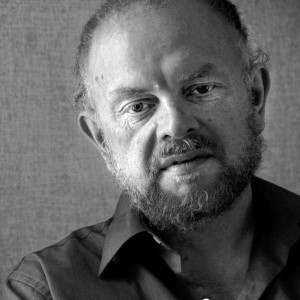 James Owens’s most recent collection of poems is Mortalia (FutureCycle Press, 2015). His poems and stories have appeared in Blue Fifth Review, Poetry Ireland, Kestrel, Appalachian Heritage, and Kentucky Review, among others. Originally from Southwest Virginia, he worked on regional newspapers before earning an MFA at the University of Alabama. He now lives in central Indiana and northern Ontario.
James Owens’s most recent collection of poems is Mortalia (FutureCycle Press, 2015). His poems and stories have appeared in Blue Fifth Review, Poetry Ireland, Kestrel, Appalachian Heritage, and Kentucky Review, among others. Originally from Southwest Virginia, he worked on regional newspapers before earning an MFA at the University of Alabama. He now lives in central Indiana and northern Ontario.
April 6, 2016
Another Cycle of the Moon, poem by Christopher Reilley
Another month, rent is due,
bills on the first,
auto loan on the fifteenth,
four Sunday dinners
and interest accrues.
The ritual of mikvah;
the Orthodox bath of family.
Welfare checks come due,
get your nails done, girl,
social security pays out on the third,
pensions and fiscal reports
are generated yet again.
One cycle of the moon,
from waxing to waning
back to waxing,
full and whole, round and bright
then
a crescent blade poised
to bleed the sky.
Ebb and flow of tides
ebb and flow of Woman
push and pull of those below,
they are not called lunatics for nothing.
The moon
pulls at us
then releases us once more,
toying with us
its cratered eyes
watching us dance to its rhythms.
Ancient marrieds drank honey wine
for a cycle of the moon
after their union night,
hence the honeymoon.
A white hare who lives there
guides the Chinese to celebrate.
American Indians sang of Tortoise
who holds the waters in check.
Authors have written of the moon’s majesties–
Hale, Maugham, Roth, and London
inspired by its cold blue reflected light
And the calendar–
Ticking off our lives,
one by one,
month by month,
named for gods,
clocking our spans,
turning the Great Wheel
one step closer.
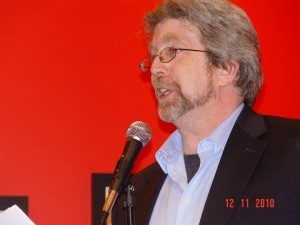 Christopher Reilley is the current poet laureate for Dedham, MA. A Pushcart nominee, he is the author of the chapbook ‘Grief Tattoos,’ and the full length collection ‘Breathing For Clouds,’ both available from Amazon. He has contributed to a wide variety of anthologies and collections, his poems appearing in the Boston Literary Magazine, Word Salad, Ragamuffin, Raven’s Desk and many others. He is a board member for the Newton Writing and Publishing Center, as well as contributing editor to Acoustic Ink. His poems can be found at chrisreilleypoems.blogspot.com.
Christopher Reilley is the current poet laureate for Dedham, MA. A Pushcart nominee, he is the author of the chapbook ‘Grief Tattoos,’ and the full length collection ‘Breathing For Clouds,’ both available from Amazon. He has contributed to a wide variety of anthologies and collections, his poems appearing in the Boston Literary Magazine, Word Salad, Ragamuffin, Raven’s Desk and many others. He is a board member for the Newton Writing and Publishing Center, as well as contributing editor to Acoustic Ink. His poems can be found at chrisreilleypoems.blogspot.com.
April 3, 2016
Lovelock, poem by Michael N. Thompson
The gulley behind the bowling alley
is a graveyard of rusted bicycle frames,
soda pop bottles and busted kites
Refinery boys march with matching lunch pails
and the chagrin worn is as plain as day
Most of them knocked up the girls
they knew from high school
and spend every weekend
working on muscle cars
that will never leave the blocks
Regurgitating the same bile
into a meat grinder
gets passed from fathers
down to their sons
Anything beyond blending in
with the rest of the herd
is seen as treason
The closest thing to gentrification
came when some fat cat
footed the bill for a new jail
Before you know it,
the years slip by
like dust between fingers
Despite its name,
there’s nothing to love
about Lovelock
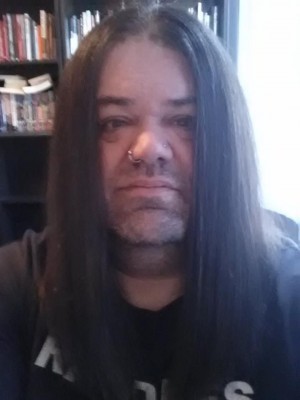 Michael N. Thompson likes bacon, fantasy football and Doctor Who. His poetry has appeared in numerous literary journals including Word Riot, Toronto Quarterly and San Pedro River Review. He is the author of four poetry collections, the most recent being A Murder Of Crows (University Of Hell Press, 2014). His next collection, Days Of Swine And Roses, will also be released through University Of Hell Press in 2017. Michael currently resides among the pastures and pines of Northern California. http://www.michaelnthompson.com/
Michael N. Thompson likes bacon, fantasy football and Doctor Who. His poetry has appeared in numerous literary journals including Word Riot, Toronto Quarterly and San Pedro River Review. He is the author of four poetry collections, the most recent being A Murder Of Crows (University Of Hell Press, 2014). His next collection, Days Of Swine And Roses, will also be released through University Of Hell Press in 2017. Michael currently resides among the pastures and pines of Northern California. http://www.michaelnthompson.com/
March 30, 2016
if something is beautiful, poem by Mark Hartenbach
if something is beautiful
it doesn’t have to say anything. it doesn’t have to matter.
it doesn’t have to work it. it doesn’t have to fit in or be
surrounded by complimentary esthetics. if something
is beautiful the steam rises off its flesh & i love the way
it wets my unshaved face. it tastes like strawberries
& harvested smoke. if something is beautiful i’m completely
unaware of the passage of time. it never loses me with
demands or tears or poetry that won’t stop running
down the page & blackens my fingers. if something is
beautiful a mournful hymn sounds like a long drawn out
ecstatic moan. if something is beautiful every inch is
absolutely essential. if something is beautiful i slip my
tongue in 360 degrees clockwise & counterclockwise,
& i listen—i don’t say a damned word.
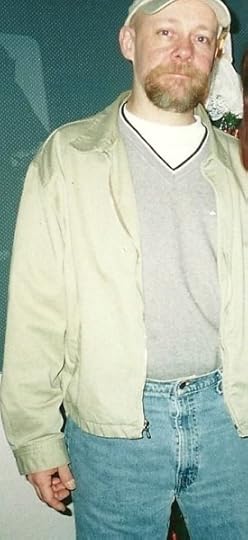 mark hartenbach’s latest book is “sad lullabies from planet appalachia.”
mark hartenbach’s latest book is “sad lullabies from planet appalachia.”
March 27, 2016
Southern Girl, fiction by Chella Courington
Homage to Jamaica Kincaid
Don’t smoke cigarettes, and if you do, never smoke in the house or on a date; and by all means don’t walk while smoking or you’ll look trashy; don’t drink till you’re twenty-one, and not much then, some boy will try to get into your pants and there you’ll be—unmarried and a baby to raise. Open the door for the person behind you, whether it’s a girl or boy; there’s no substitute for good manners, it means good breeding; whenever you leave, be sure Blackie has water in the backyard and front. Always answer the phone on the second ring; the first makes you look too eager, no sought-after girl wants to look eager; the third ring makes you look lazy, a sign you’ll be fat one of these days; and work on baking your biscuits, just never eat them or you’ll be big as a house. Always be sweet as pie to the postman, Blackie’s bitten him twice; never contradict your father, especially when he comes home from work; after he’s had two bourbons and finished the news, then you can talk. Always close the door to your bedroom; you never know when a workman’s in the house, and if he sees your bed, he’ll think you’re a loose girl and start talk about you. Don’t let air escape in public; it shows you were raised in a barn; bathe once a day, and if you can’t, always take a whore’s bath; a lady never smells, and that goes for deodorant too. Don’t spit in public; a lady never spits when she can be seen, and if you have a piece of chicken you can’t swallow, excuse yourself and spit it in the toilet. Pay attention to the preacher on Sunday; if his wife catches you looking off, she might think you’re tired from fooling around Saturday night and start talking about you. Take the house key whenever you leave; you never know when your father or I may run out; and never on your life have a boy inside this house unless one of us is here. Boys are out for one thing, and if you’re that kind of girl, you’re going to wind up like your cousin Lynette—unmarried and a baby to raise.
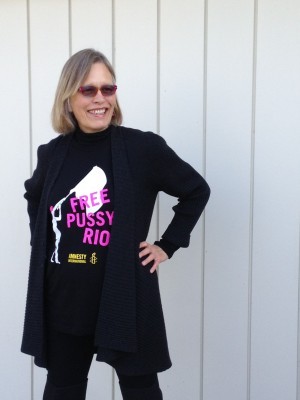 Chella Courington is a writer and teacher. With a Ph.D. in American and British Literature and an MFA in Poetry, she is the author of four poetry and three flash fiction chapbooks. Her poetry and stories appear in numerous anthologies and journals including SmokeLong Quarterly, Nano Fiction, The Los Angeles Review, and The Collagist. Her recent novella, The Somewhat Sad Tale of the Pitcher and the Crow, is available at Amazon. Reared in the Appalachian South (North Alabama), she now lives in Santa Barbara, CA, with another writer and two cats.
Chella Courington is a writer and teacher. With a Ph.D. in American and British Literature and an MFA in Poetry, she is the author of four poetry and three flash fiction chapbooks. Her poetry and stories appear in numerous anthologies and journals including SmokeLong Quarterly, Nano Fiction, The Los Angeles Review, and The Collagist. Her recent novella, The Somewhat Sad Tale of the Pitcher and the Crow, is available at Amazon. Reared in the Appalachian South (North Alabama), she now lives in Santa Barbara, CA, with another writer and two cats.
March 24, 2016
Honky-Tonk, poem by David Jibson
Outside, a mercury vapor lamp
on its tall wooden pole throws blue fire
down onto the gravel parking lot below,
where cowboys riding pick up trucks
instead of horses scuffle with each other
in the shadows to preserve their honor.
Blood and spit dampen the earth.
Loose coins spilled from their pockets shine
like crystals of a broken geode in the dust
their snakeskin boots have scuffed into a roiling cloud.
Inside, Arkansas Slim and his Ozark Ramblers
have knocked off for the night.
From the jukebox Tammy Wynette cries
Stand By Your Man.
On the dance floor the last few couples
struggle to hold each other up,
spinning dreamily toward last call,
eyes on empty, feet barely moving.
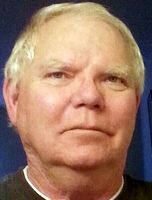 David Jibson grew up in rural Michigan and now lives and writes in Ann Arbor. He is an associate poetry editor of “Third Wednesday”, a literary arts journal and member of the Crazy Wisdom Poetry Circle. He has retired several times, but keeps stumbling into new careers, most recently working for a non-profit hospice agency. He thinks the most important element of his poetry is “story”.
David Jibson grew up in rural Michigan and now lives and writes in Ann Arbor. He is an associate poetry editor of “Third Wednesday”, a literary arts journal and member of the Crazy Wisdom Poetry Circle. He has retired several times, but keeps stumbling into new careers, most recently working for a non-profit hospice agency. He thinks the most important element of his poetry is “story”.
March 21, 2016
September Fields, poem by Andrew Taylor
Through hedgerow gaps between trees
an undulation perhaps it’s to do with
colour a golden calm sets in at summer’s
end spiders come in from cooling night air
heating is entertained flowers last through
though the evenings don’t gather wood
like windfalls essential in preparation
warming like a playing angel
in candlelight shadows alter with draughts
that rise through polished floorboards
kicking fallen leaves in tyre tracks
those who have gone before somehow remain
as gouges in earth and remaining leaves
on trees evergreens that battle winter
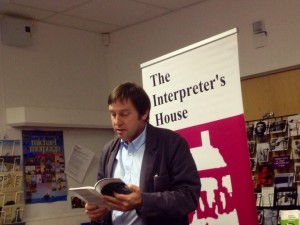 Andrew Taylor is a Nottingham (UK) based poet, editor and critic. His debut collection, ‘Radio Mast Horizon’ was published by Shearsman Books in 2013. His latest pamphlet ‘Future Dust’ was published in 2015. Poems have appeared recently in Coney’s Loft, The Goose, Instant Pussy and Rusty Truck. He is a lecturer in Creative Writing and English at Nottingham Trent University. www.andrewtaylorpoetry.com
Andrew Taylor is a Nottingham (UK) based poet, editor and critic. His debut collection, ‘Radio Mast Horizon’ was published by Shearsman Books in 2013. His latest pamphlet ‘Future Dust’ was published in 2015. Poems have appeared recently in Coney’s Loft, The Goose, Instant Pussy and Rusty Truck. He is a lecturer in Creative Writing and English at Nottingham Trent University. www.andrewtaylorpoetry.com
Fried Chicken and Coffee
- Rusty Barnes's profile
- 227 followers



